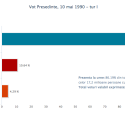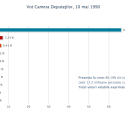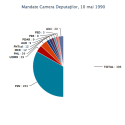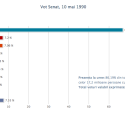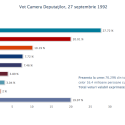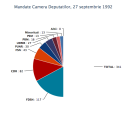IMPORTANT DEVELOPMENTS
1. SCHENGEN. European Commissioner Stefan Fule declared that the European Commission does not support the attempt of several member states to impose a political link between the Cooperation and Verification Mechanism and Romania and Bulgaria’s accession to the Schengen Area.
2. GOVERNMENT INTENTIONS. The Government intends to assume responsibility in front of the Legislature for a new law concerning the restitution of properties confiscated during the Communist period. The law will ensure justice is done to the former owners and that real-estate speculation concerning these properties will end.
3. Infrastructure. Prime Minister Victor Ponta assured the public that works on the new Bucharest subway line will continue and that adequate funding will be given for the project.
4. Political dynamics: The competition between the factions of the PDL, the main opposition party becomes more intense, even though Vasile Blaga remains the favorite.
1. The Romanian Government supports the creation of a EU mechanism for protecting the rule of law
Taking part to the reunion of the European Socialists, Prime Minister Victor Ponta declared that the Romanian Government supports the establishment of a European institutional mechanism, designed to monitor the observance of the rule of law and of European standards. Victor Ponta insisted that setting-up such a mechanism is in Romania’s interest, becoming thus another proof that Romania is capable of observing the European standards.
The Prime Minister added that establishing such a mechanism, which should monitor the political dynamics in all member states, could prove an attractive and efficient alternative to the Cooperation and Verification Mechanism, which bears little or no resemblance to its initial 2005 objectives.
The European Commission does not support connecting the MCV with Romania’s Schengen Area bid
Stefan Fule, European Commissioner responsible for enlargement and European neighborhood policy declared that the European Commission does not support the attempt of several states to make a political connection between Romania and Bulgaria’s accession to the Schengen Area and the Cooperation and Verification Mechanism (MCV).
Romania’s accession to the Schengen area was blocked for political reasons, but the Government underlined that it remains one of the prominent foreign policy objectives. Nevertheless, Prime Minister Victor Ponta emphasized that Romania will address also other paramount European policy objectives, such as increasing the European funding absorption rate.
Moreover, the Prime Minister declared that several high-profile issues for other member states, such as the Roma immigration or the migration of the Romanian labor force after the lifting of limitations will be addressed by Government actions and policies. The Prime Minister also emphasized that fears concerning a massive immigration wave come 2014 are unwarranted, commenting also on the positive role Romanian workers played and continue to play in EU countries such as Great Britain or Germany.
2. The law concerning the restitution of properties will bring justice for the owners
The USL Government discussed the draft of a new law concerning the restitution of properties confiscated during the Communist period. Senior government officials have expressed their hopes that the new framework will bring justice to the former owners, as well as limiting the speculative transactions concerning such properties. The Government will pass the law on March 26, by assuming its responsibility for the initiative in front of the Legislature.
The draft is subject to a period of public debate. Calls for amendments have been made to all political groups and the draft was also sent to the ECHR for comments. Insofar, the informal reaction of ECHR representatives has been favorable.
The draft is based on three principles: integral restitution whenever possible, replaced by a pecuniary compensation by installments, for 7 years. Secondly, all buildings currently used as schools, hospitals or culture institutions will be returned to their owners provided their current destination is kept for the following 20 years. Last, purchasers of litigious rights will be subject to an 85% tax.
The Government believes the new law will address an issue that hasn’t been solved for the past 23 years and will put an end to real-estate speculation that has been directly backed by political forces. Moreover, the law has the capacity to set Romania’s record straight once and for all in front of the ECHR, which has repeatedly penalized the Romanian state for its inconsistent legal framework concerning such properties.
3. The works on the new subway line will continue
Prime Minister Victor Ponta has announced that the Government will make funding available for resuming the works on the new Bucharest subway line next week. Victor Ponta ensured the inhabitants of the capital that the project will continue. The Prime Minister also emphasized that grave irregularities were found by the Prime Minister’s Control Corps with Metrorex, the state agency overseeing the Capital’s subway system. The contract for the new subway line was negotiated by the Boc Cabinet.
Not only is the price of the project extremely high, costing as much as the Comarnic-Brasov highway, but also the funding for the project as established by the PDL Cabinet was inadequate. Out of the 1.2 billion Euros contract, the Boc Cabinet spent only 2.5 million Euros on the project. The report also found that vast sums were spent by Metrorex on useless feasibility studies.
4. The struggle for the mastery of the PDL continues
A week before the National Convention of the PDL, which is supposed to elect the new leadership of the main opposition party, the political contest has little to do with the race itself and more with the course the main PDL actors will take after the internal elections.
Vasile Blaga continues to be the favorite, but several media are already pointing towards a Convention that is heavily institutionally biased towards the PDL heavyweight. The media is reporting an increasing number of accusations and criticism, whereas the replies of Blaga’s side are less visible.
The objective of the main challenger, Elena Udrea, seems to be that of delegitimizing the Convention itself. Pundits speculate that in order to remain legitimate in front of the PDL electorate, Udrea’s other option than winning the elections is courting those who believe that a new center-right party is the best political solution in the current context.
The reform-minded members of the PDL are more intent on showing that they put up a fight for the leadership of the party, in order to avoid the eventual criticism that they refused to take a stand, even thought the group is a strong proponent of setting up a new political organization. Therefore, both Elena Udrea and the “reformists” are prone to abandon the party, provided Blaga wins.



